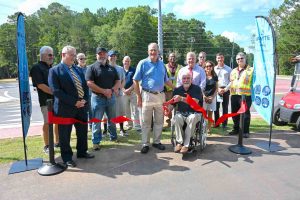For all intents and purposes it will be Fayetteville Mayor Ken Steele who will be one of the two Fayette County representatives on the Regional Transportation Roundtable that will produce a list of proposed transportation projects for the 10-county Atlanta Regional Commission (ARC).
The final list to be determined later will go before voters in mid-2012 in the form of a 10-year, one-cent transportation sales tax.
Georgia Department of Transportation (DOT) Planning Director Todd Long said that, given the stipulation in the law, the group of Fayette County mayors had until midnight on Nov. 10 to make any other change of mayoral representation beyond the one made earlier this week when the mayors of Woolsey, Brooks and Fayetteville voted 3-0 to change the representative from Peachtree City Mayor Don Haddix to Fayetteville’s Steele.
Haddix had been elected earlier in the fall to be the county’s mayoral representative. Neither Haddix nor Tyrone Mayor Don Rehwaldt attended the meeting Monday night when Steele was elected.
Questioned about which mayor should represent the county on the RTR, Todd said he had received no other communication from Fayette County by midnight on Nov. 10. That said, and with Steele being the most recent selection by the Fayette mayoral caucus on Monday, it will be Steele who will represent Fayette beginning in 2011, along with the new Fayette County Commission chairman.
Long said the one-cent transportation sales tax legislation (House Bill 277) was very clear that a mayoral representative was to be elected by Nov. 10. The bill was very quiet on how that was to be done, Long said.
“I got a mayor representative from Peachtree City and (now) I’ve got a revised representative (in correspondence earlier this week) from Fayetteville,” Long said. “Common sense says you need documentation.”
The reason for that documentation deals with what Long said is outlined in the legislation that establishes the roundtables. The roundtables, he said, were intended to be locally controlled. Otherwise, the legislation would not have passed through the General Assembly, Long told The Citizen yesterday.
“The bill is very clear that the state is not part of the local selection process of a mayoral representative on the roundtable. I really do not think any of our 159 counties want the state to step in and decide representation from a county. As far as I can tell in my reading of the bill, a county can change their selection as many times as they want to before submitting a name to be on the roundtable by Nov. 10,” Long said in an email sent last night. ”I have heard from many of you and have talked to the press several times. I have been consistent in all of my answers. The last correspondence we have received was from a majority of mayors from Fayette County indicating that Ken Steele was chosen. It matters not that previous elections were held. I hope this clarifies my position and we can move forward.”
Haddix in an email Thursday night and subsequent to the one sent by Long gave his perspective on the issue.
“That is not agreeing with my communications with Todd Long. In an email conversation Todd Long said this needed resolved at the local level. He neither sided with Ken Steele or me. Like it or not that was a legal position to kick it back to Fayette County. It was made by the official at the final step of the process. My position is that the bill required an election on or before Nov. 10. That was accomplished with my name submitted and publicly acknowledged by Ken Steele in a press release. So a legal decision and announcement was made per HB 277 and Ken Steele made it,” Haddix said.
“Now, what will happen if both of us show up at a meeting? If one is seated over the other, that is a legal decision. If no one is seated that is a legal decision. So no matter how you phrase it, Todd Long has already made a legal decision in kicking it back and will have to make another if we both show up for meetings,” Haddix continued.
“So, what are my options? That would be to resign, refuse to resign and go to court or refuse to resign and not go to court forcing either Steele to go to court or Todd Long to make a decision on who, if anyone is seated. None are good options in my book.”
Haddix in his attempt to resolve the matter of Long’s statement solicited the opinion of state Rep. Matt Ramsey, an attorney with a Peachtree City law firm. Communicating Ramsey’s response, Haddix in a Wednesday email indicated that Ramsey had said, “This required being taken to court to resolve it. He neither sided with Ken Steele or me. But that, again, was a legal decision.”
Contacted Thursday, Ramsey provided The Citizen with a copy of his exact response to Haddix.
“No, I am not making a statement as to the appropriateness or inappropriateness of any action by the DOT. You said in your original email that the guy at DOT is ‘refusing to take a position’ and I’m suggesting it would be inappropriate for the DOT, or any executive branch official for that matter, to in any way arbitrate a dispute such as this,” Ramsey told Haddix.
“As for my position, I believe in a very strict construction of the U.S. and Georgia constitutions and strongly believe in adhering to the constitutionally mandated separation of powers set out in both those documents,” Ramsey continued. “Our Constitution set up an explicit and distinct separation between the judicial, legislative and executive branches of our government which should be followed to preserve the proper checks and balances established in our system of government. It would be a gross overstep of my role as a legislator to render a legal judgment or opinion in a dispute over the application of a statute in a local matter such as this. Repeated examples in recent years of elected officials ignoring the fundamental framework of our Constitution are exactly why people are mad at government, as you suggest they are. Arbitrating disputes and interpreting laws is the province of the judicial branch of government.”
The mayoral maelstrom, at least in part, stems from recent comments by Haddix, and Rehwaldt, surfacing the idea that Fayette County might benefit more from moving from the ARC to the more rural Three Rivers Regional Commission. Those statements were a main thrust of the meeting Monday night when Steele was elected to replace Haddix as the Fayette mayoral representative.
==========================================================
1st print version 11-10-10 by JOHN MUNFORD and BEN NELMS —
Call it a lexical standoff: Peachtree City Mayor Don Haddix is either on or off an important regional group, depending on whom you ask and which law they cite.
Fayette County may — or may not — have a new representative on a regional “roundtable” group of officials who are compiling a list of transportation projects for a potential one percent regional sales tax.
Three of Fayette’s five mayors met Monday evening and voted 3-0 to appoint Fayetteville Mayor Ken Steele as the new mayoral representative to the roundtable.
In theory, Steele would be replacing Peachtree City Mayor Don Haddix, whom the mayors had elected to the same position on a 3-2 vote several weeks ago. Haddix contends that he remains the representative since the legislation which created the roundtable contains no language that would allow any roundtable representative to be removed.
The three mayors who voted for Steele, including Brooks Mayor Dan Langford, Woolsey Mayor Gary Laggis and Steele himself, argued that the legislation, House Bill 277, allows them the leeway to appoint a representative other than Haddix.
At the meeting, Steele said Haddix’s comments opposing the sales tax had damaged Fayette’s credibility on the 21-member roundtable.
“Our obligation is to take HB 277 and play as prominent a role as possible,” Steele said. “There must be projects for each constituency or it will lose support.”
Haddix said Monday that he would not resign, adding that it would be up to state Transportation Director Todd Long to determine whether he or Steele is Fayette’s mayoral representative on the roundtable. Fayette has one other representative on the roundtable, recently-defeated County Commission Chairman Jack Smith, who will be replaced in January when the commission elects a new chairman.
Haddix boycotted Monday’s called meeting of the mayors based on a contention that any vote to remove Haddix “will be void by law and case law,” he wrote in a letter to his fellow mayors. Tyrone Mayor Don Rehwaldt also skipped the meeting but advocated for Haddix to remain the representative.
While there has been some argument that the law didn’t contain any ability to remove a roundtable member because the legislature didn’t consider it, Haddix points out that the law includes language that allows for MARTA board members to be removed from their posts.
As of this writing it is not certain whether Haddix or Steele will be Fayette’s mayoral representative on the roundtable. But time is of the essence to settle the issue as the roundtable’s first “official” meeting is slated for next month to formally vote on criteria by which the various regional transportation projects will be judged.
The clamor for Haddix to be replaced was voiced countywide, as the Peachtree City, Tyrone and Fayetteville city councils voted last week to ask the group of Fayette’s five mayors to appoint someone other than Haddix to the position.
At last week’s Peachtree City Council meeting, some of Haddix’s fellow council members argued that Haddix damaged the county’s credibility in the negotiation process due to his failed bid to have Fayette County removed from the Atlanta Regional Commission in an effort to perhaps avoid the sales tax entirely.
The sales tax, if approved region-wide among Fayette and nine other counties in the metro Atlanta area, is anticipated to raise about $700 million a year for 10 years.
Haddix, who several weeks ago contended there are no regional projects in Fayette County that will qualify for the regional transportation funding, has since said that specifically he would ask for improvements to the often-clogged interchange between Ga. Highway 74 north and Interstate 85 in Fairburn.
Haddix contends that because the funds will be spent on areas of high traffic congestion, Fayette stands to be paying into the regional sales tax far more than it will receive in return in transportation improvement projects.
Another significant hurdle for any Fayette projects making the regional sales tax list is a requirement that the projects already be “underway” in some shape or form, which at a minimum means having some sort of engineering study or traffic analysis done and can include the purchase of necessary right of way, Haddix said.
Fayette has no such projects that have advanced to those levels, Haddix said.
Haddix said he is working to make changes so Peachtree City’s golf cart path system can qualify for regional funding. He also argued that he will represent all of Fayette County, as he has already communicated with officials from Tyrone and has met with the Brooks Town Council for a question and answer session about the regional transportation roundtable.
“I made it real clear that even though Peachtree City is the key, we are one county. And I already said that on regional projects I am going to fight for the things that help Fayette County,” Haddix said.
While Haddix acknowledged that projects just outside Fayette County could benefit Fayette residents, such as the potential widening of Ga. Highway 314 in Clayton County, Fayette County cannot submit that project for funding on the list.
Furthermore, Haddix argues that the improvements to the I-85/Hwy. 74 interchange, while a high priority for Fayette County, would not be supported by other members of the roundtable.
Haddix contends that the “core counties” of metro Atlanta, which are the largest population-wise and includes Fulton, DeKalb, Cobb and Gwinnett, have the majority voting power of 11 votes so they can fully control what is on the final roundtable-approved project list, which is the same one that will be going before voters for the regional tax.
Any transportation project not on that list is ineligible for funding from the sales tax, which if approved is expected to rake in $7 billion over the 10-year period.
Haddix contends that the reasoning for removing him from the roundtable has to do with his wish for Fayette County to leave the Atlanta Regional Commission and join the more rural Three Rivers Regional Commission, which includes Coweta and Spalding counties among others further south of Atlanta.
Specifically, Haddix cites a 2007 transit plan created for metro Atlanta called Concept 3, which included a bus system that would run through Clayton, Fayette and Coweta counties and a potential light rail corridor going through Tyrone, Peachtree City and into Senoia with a final terminus of downtown Atlanta.
“If we were to leave and go to Three Rivers … what does that do to Concept 3?” Haddix said. “You just removed a whole county from the plan … it would punch a big hole in the plan. I believe that was a major catalyst here.”
Haddix contends there is a broad move to have Concept 3 projects funded by the tax, and that there is an initiative underway to create a regional transit agency that would remove local decision-making from the transit process at the county level.
Several years ago, the Fayette County Commission declined an offer to fund commuter buses in a partnership with the Georgia Regional Transportation Authority. Instead, a number of Fayette residents have taken transit into their own hands, signing up for a vanpool service in which residents rideshare during their commutes using a large van.
Tyrone Mayor Don Rehwaldt, who supported Haddix’s failed bid to move Fayette from the Atlanta to the Three Rivers Regional Commission, wrote his fellow mayors a letter urging them to allow Haddix to keep his seat on the roundtable.
“Please take the high road and realize that any action you are contemplating is really not an ethical direction and that you should honor the official, and only, voting results,” Rehwaldt wrote. “Ken, I am speaking from the heart! An attempt to remove Mayor Haddix from the Regional Roundtable is almost a moot point and will have no effect on the outcome of selected projects.”












Leave a Comment
You must be logged in to post a comment.